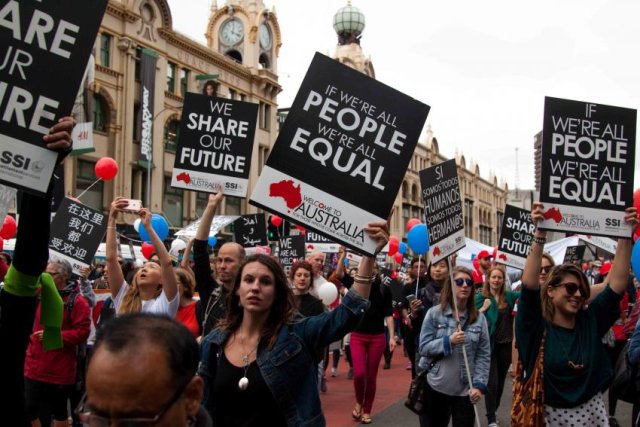
Celebrations of multiculturalism happened in 26 cities and rural locations across Australia on October 22 as part of Welcome to Australia events organised under the theme of “Walking together to welcome refugees”.
In Sydney, helium balloons, musical performances, bright red shirts and smiles gave it a carnival like atmosphere. For some it would have been their first refugee rights event.
Mothers for Refugees, Grandmothers for Refugees, Doctors for Refugees, Refugee Action Coalition, the Socialist Alliance, the Greens and People Just Like Us were all present with banners and placards opposing detention.
While the organisers had hoped to lead a silent walk with only some drumming, a chant of “Say it loud, say it clear, refugees are welcome here” was started in the heart of the walk and spread to the front as more people joining in.
It was another decent mobilisation of the growing refugee rights campaign that occurred only days after an important victory with the announcement that medical professionals are now exempt from the Border Force Act.
In contrast to the mood of the crowd of support for an end to the detention system, Welcome to Australia used the event to give Labor a platform to extol its support for a vague concept of multiculturalism while simultaneously distracting from its policy of boat turnbacks and indefinite detention of asylum seekers and refugees.
Deputy opposition leader Tanya Plibersek spoke in Sydney and former immigration minister Tony Burke addressed the walk in Adelaide.
Plibersek gave a personal story of how her family fled war and persecution in Europe, ultimately being resettled in Australia. When some in the crowded heckled that people fleeing conditions similar to those faced by her family were currently being sent to Manus Island and Nauru detention centres, she tried to shrug it off and continue with her story. There was no attempt to justify Labor’s increasingly unpopular refugee policy.
Burke played a similar tune, one of vague sentiments of supporting multiculturalism — while ignoring his party’s policy of indefinite detention.
Burke was immigration minister in 2013 and one of the key architects of Australia’s current policy of offshore detention and resettlement. He was a target at numerous refugee rights protests.
Yet Welcome to Australia gave him a platform to justify his crimes against humanity and to try and differentiate Labor from the Coalition — despite both having the same inhumane refugee policy.
The last few elections have shown just how bipartisan current refugee policy is, with Labor taking the lead on many of its worst aspects, such as offshore resettlement.
Give a platform at welcome refugee events to leading Labor MP’s who actively support a policy that deliberately results in children being physically abused, women sexually assaulted and people being pushed to commit suicide is not just morally incomprehensible — it is damaging to the movement that seeks to put an end to this policy.
It is a fallacy to think that an approach of replacing the current Coalition government with a Labor government will lead to a change in refugee policy. Labor’s refugee policy in 2013 was just as bad, if not worse than the Coalition’s refugee policy under the previous John Howard government.
Such an approach however, presents Labor with an opportunity to work towards demobilising or co-opting a movement that is putting it under pressure.
It gives Labor the chance to play both sides of the fence: tough on border protection on one hand while appeasing sections of its base with its multiculturalism. Meanwhile refugees continue to suffer in detention.
The movement has made gains this year in terms of growing breadth by targeting all parties that supports the current refugee policy. This was the case, for example, with the Love Makes A Way actions in response to the Nauru Files, which involved over 50 simultaneous protests outside politician’s offices.
The other weakness of the Walk Together events was that it had no demands. It did not call for an end to detention or to bring all asylum seekers and refugees on Manus Island and Nauru to Australia.
Social movements have made advances when they have raised concrete demands, from stopping a gas well to allowing women to vote or raising the minimum wage.
Multicultural celebrations are worthwhile events, but they are not a substitute or alternative strategy for highlighting the need to end indefinite detention. They should not be used to give Labor a platform to appease sections of the community while they continue to support the detention system.
Broad mobilisations that clearly target both the Coalition and Labor’s rotten refugee policy are needed if we want to really welcome refugees to Australia.
Like the article? Subscribe to Green Left now! You can also like us on Facebook and follow us on Twitter.